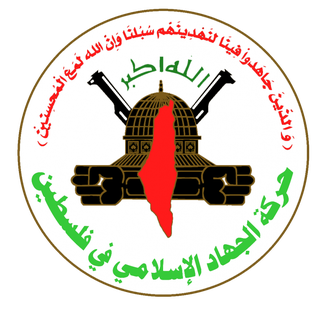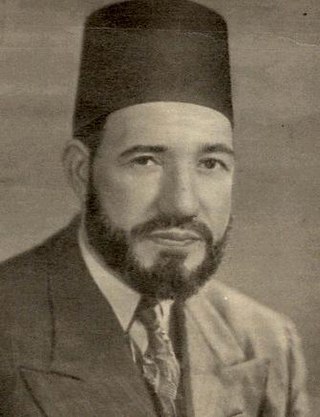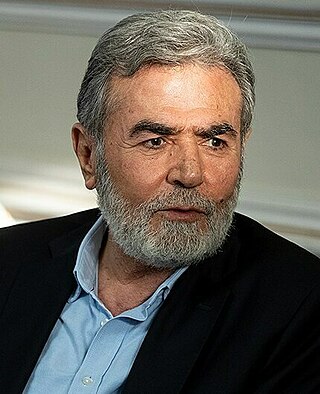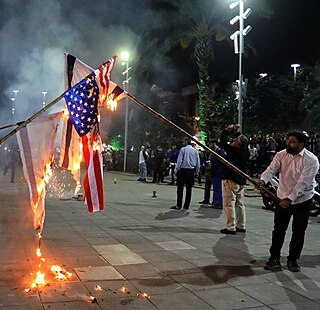Related Research Articles

Jenin is a city in the State of Palestine, in the Israeli-occupied West Bank. The city serves as the administrative center of the Jenin Governorate of Palestine and is a major center for the surrounding towns. Jenin came under Israeli occupation in 1967, and was put under the administration of the Palestinian National Authority as Area A of the West Bank in 1993.

Al-Quds Brigades is a paramilitary organisation and the armed wing of the Palestinian Islamist organization Palestinian Islamic Jihad (PIJ), which is the second largest group in the Gaza Strip, after Hamas. AQB's leader is Ziyad al-Nakhalah, based in Damascus, Syria. The head of AQB in the Gaza Strip was Baha Abu al-Ata until he was killed in November 2019.

Fathi Ibrahim Abdulaziz Shaqaqi was a Palestinian physician, militant leader and the founder and Secretary-General of the Palestinian Islamic Jihad (PIJ).

Abd Al Aziz Awda, also known as Sheik Awda, is a Palestinian cleric who, along with Fathi Shaqaqi, founded the Islamic Jihad Movement in Palestine, also known as the Palestinian Islamic Jihad (PIJ), an Islamist paramilitary organization based in Damascus, Syria.

The flag of Hezbollah is the flag of the Shi'a political and military organization Hezbollah. The flag depicts a stylized representation of the Arabic words حزب الله in Kufic script. Written near the first letter of the word Allah, there is a hand that reaches up to grasp a stylized assault rifle. The flag incorporates several other symbols, namely a globe, a book, a sword, and a seven-leafed branch. The text above the logo reads فإن حزب الله هم الغالبون and means "Then surely the party of God are they that shall be triumphant", which is a reference to the name of the party. Underneath the logo are the words المقاومة الإسلامية في لبنان, meaning "The Islamic Resistance in Lebanon".

Sunni Islam is a major religion in Palestine, being the religion of the majority of the Palestinian population. Muslims comprise 85% of the population of the West Bank, when including Israeli settlers, and 99% of the population of the Gaza Strip. The largest denomination among Palestinian Muslims are Sunnis, comprising 98–99% of the total Muslim population.

The Islamic Jihad Movement in Palestine, commonly known simply as Palestinian Islamic Jihad (PIJ), is a Palestinian Islamist paramilitary organization formed in 1981.

While anti-Zionism usually utilizes ethnic and political arguments against the existence or policies of the state of Israel, anti-Zionism has also been expressed within religious contexts which have, at times, colluded and collided with the ethnopolitical arguments over Israel's legitimacy. Outside of the liberal and socialist fields of anti-Zionist currents, the religious arguments tend to predominate as the driving ideological power within the incumbent movements and organizations, and usually target the Israeli state's relationship with Judaism.
David Tal is an Israeli historian and professor. Since 2009, he has been the Kahanoff Chair in Israeli Studies at the University of Calgary. He is an expert on Israel's security and diplomatic history, as well as U.S. disarmament policy.

Hassan Ahmed Abdel Rahman Muhammed al-Banna, known as Hassan al-Banna, was an Egyptian schoolteacher and imam, best known for founding the Muslim Brotherhood, one of the largest and most influential Islamic revivalist organizations.

The September 11 attacks were carried out by 19 hijackers of the Islamist militant organization al-Qaeda. In the 1990s, al-Qaeda leader Osama bin Laden declared a holy war against the United States, and issued two fatāwā in 1996 and 1998. In the 1996 fatwā, he quoted the Sword Verse. In both of these fatāwā, bin Laden sharply criticized the financial contributions of the American government to the Saudi royal family as well as American military intervention in the Arab world.
Soviet pro-Arab propaganda describes a campaign of Soviet propaganda initiated as a means of developing support from the Arab nations in the Middle East which would commonly involve expressing contempt for the actions of Israel and the United States.
Khader Adnan Mohammad Musa was a Palestinian activist and prisoner in Israel who died after an 87-day hunger strike in protest of his detention without trial. By the time of his death, he had been arrested 12 times by Israel. He became prominent as a figure after a 66-day hunger strike in 2011 that led to a mass hunger strike among Palestinian prisoners and his ultimate release.
China's Special Envoy on the Middle East Issue is a special diplomatic position appointed by the Chinese Foreign Ministry. The Special Envoy focuses primarily on facilitating the Arab-Israeli peace process, although at various times, the Special Envoy has also addressed other major issues including the conflict in Syria.

The Sabireen Movement, officially the Movement of the Patient ones in Support for Palestine– Hisn, was a Shiite Palestinian militant group that operated from 15 May 2014 to March 2019.

Ziyad al-Nakhalah is a Palestinian politician who is the leader of the Palestinian Islamic Jihad (PIJ).

Ahmad Zayni Dahlan (1816-1886) was the Grand Mufti of Mecca between 1871 and his death. He also held the position of Shaykh al-Islam in the Hejaz and Imam al-Haramayn. Theologically and juridically, he followed the Shafi'i school of thought.

The 2022 Gaza–Israel clashes code-named as Operation Breaking Dawn lasted from 5 to 7 August 2022. The Israel Defense Forces (IDF) conducted some 147 airstrikes in Gaza and Palestinian militants fired approximately 1,100 rockets towards Israel. The operation, ordered by Prime Minister Yair Lapid and Defense Minister Benny Gantz without prior Cabinet discussion or approval, followed a raid in Jenin in the Israeli-occupied West Bank, in which Israeli forces arrested Bassam al-Saadi, a leader of the Palestinian Islamic Jihad (PIJ) in that area. On 6 August, Israel arrested 20 people in the West Bank of whom 19 were members of PIJ and a further 20 on 7 August according to an unnamed Israeli official.

There have been explicit or implicit expressions, statements, and rhetoric made by individuals, political entities, and factions within Arab, Islamic, Palestinian or left-wing discourse advocating for the elimination or annihilation of the State of Israel as a political entity. These anti-Zionist calls often involve the use of strong language, genocidal threats, or declarations aiming at the complete eradication of Israel from the region. Such expressions may be manifested in official statements, speeches, charters, or public discourse, reflecting a position that denies the legitimacy of Israel's existence and seeks its removal through various means, including military action or other forms of political and ideological resistance.

In the Israeli–Palestinian conflict, the term shahid is used by Palestinians to refer to any killed Palestinian civilian or fighter, regardless of their religious affiliation, and regardless of whether or not their killing was the result of a targeted attack.
References
- 1 2 Alexander, Yonah (2002-01-01). Palestinian Religious Terrorism: Hamas and Islamic Jihad. Brill | Nijhoff. p. 29. doi:10.1163/9789004479814. ISBN 978-90-04-47981-4.
- ↑ Skare, Erik (2021). A history of Palestinian Islamic Jihad : faith, awareness, and revolution in the Middle East. Cambridge, United Kingdom. p. 38. ISBN 978-1-108-95444-0. OCLC 1196822773.
{{cite book}}: CS1 maint: location missing publisher (link) - 1 2 3 Alavi, Seyed Ali (2020). Iran and Palestine : past, present, future. Abingdon, Oxon. pp. 83–99. ISBN 978-0-429-27707-8. OCLC 1090706836.
{{cite book}}: CS1 maint: location missing publisher (link) - 1 2 3 Skare, Erik (2021). A history of Palestinian Islamic Jihad : faith, awareness, and revolution in the Middle East. Cambridge, United Kingdom. pp. 39–43. ISBN 978-1-108-95444-0. OCLC 1196822773.
{{cite book}}: CS1 maint: location missing publisher (link) - ↑ Skare, Erik (2021). A history of Palestinian Islamic Jihad : faith, awareness, and revolution in the Middle East. Cambridge, United Kingdom. p. 39. ISBN 978-1-108-95444-0. OCLC 1196822773.
{{cite book}}: CS1 maint: location missing publisher (link) - 1 2 3 4 Alavi, Seyed Ali (2020). Iran and Palestine : past, present, future. Abingdon, Oxon. pp. 86–93. ISBN 978-0-429-27707-8. OCLC 1090706836.
{{cite book}}: CS1 maint: location missing publisher (link) - ↑ Skare, Erik (2021). A history of Palestinian Islamic Jihad : faith, awareness, and revolution in the Middle East. Cambridge, United Kingdom. pp. 39–43, 56–57. ISBN 978-1-108-95444-0. OCLC 1196822773.
{{cite book}}: CS1 maint: location missing publisher (link) - 1 2 3 Skare, Erik (2021). A history of Palestinian Islamic Jihad : faith, awareness, and revolution in the Middle East. Cambridge, United Kingdom. pp. 42–43. ISBN 978-1-108-95444-0. OCLC 1196822773.
{{cite book}}: CS1 maint: location missing publisher (link) - ↑ Alavi, Seyed Ali (2020). Iran and Palestine : past, present, future. Abingdon, Oxon. p. 91. ISBN 978-0-429-27707-8. OCLC 1090706836.
{{cite book}}: CS1 maint: location missing publisher (link) - ↑ Hatina, Meir (2001). Islam and salvation in Palestine : the Islamic Jihad movement. Tel Aviv: Moshe Dayan Center for Middle Eastern and African studies, Tel Aviv University. p. 54. ISBN 965-224-048-6. OCLC 48140580.
- ↑ Alavi, Seyed Ali (2020). Iran and Palestine : past, present, future. Abingdon, Oxon. p. 88. ISBN 978-0-429-27707-8. OCLC 1090706836.
{{cite book}}: CS1 maint: location missing publisher (link) - ↑ Alavi, Seyed Ali (2020). Iran and Palestine : past, present, future. Abingdon, Oxon. pp. 95–99. ISBN 978-0-429-27707-8. OCLC 1090706836.
{{cite book}}: CS1 maint: location missing publisher (link) - ↑ Skare, Erik (2021). A history of Palestinian Islamic Jihad : faith, awareness, and revolution in the Middle East. Cambridge, United Kingdom. pp. 43–48. ISBN 978-1-108-95444-0. OCLC 1196822773.
{{cite book}}: CS1 maint: location missing publisher (link) - ↑ Hatina, Meir (2001). Islam and salvation in Palestine : the Islamic Jihad movement. Tel Aviv: Moshe Dayan Center for Middle Eastern and African studies, Tel Aviv University. p. 48. ISBN 965-224-048-6. OCLC 48140580.
- ↑ Skare, Erik (2021). A history of Palestinian Islamic Jihad : faith, awareness, and revolution in the Middle East. Cambridge, United Kingdom. p. 45. ISBN 978-1-108-95444-0. OCLC 1196822773.
{{cite book}}: CS1 maint: location missing publisher (link) - ↑ Skare, Erik (2021). A history of Palestinian Islamic Jihad : faith, awareness, and revolution in the Middle East. Cambridge, United Kingdom. pp. 46, 57. ISBN 978-1-108-95444-0. OCLC 1196822773.
{{cite book}}: CS1 maint: location missing publisher (link) - ↑ Skare, Erik (2021). A history of Palestinian Islamic Jihad : faith, awareness, and revolution in the Middle East. Cambridge, United Kingdom. pp. 44–48. ISBN 978-1-108-95444-0. OCLC 1196822773.
{{cite book}}: CS1 maint: location missing publisher (link) - ↑ Hatina, Meir (2001). Islam and salvation in Palestine : the Islamic Jihad movement. Tel Aviv: Moshe Dayan Center for Middle Eastern and African studies, Tel Aviv University. p. 52. ISBN 965-224-048-6. OCLC 48140580.